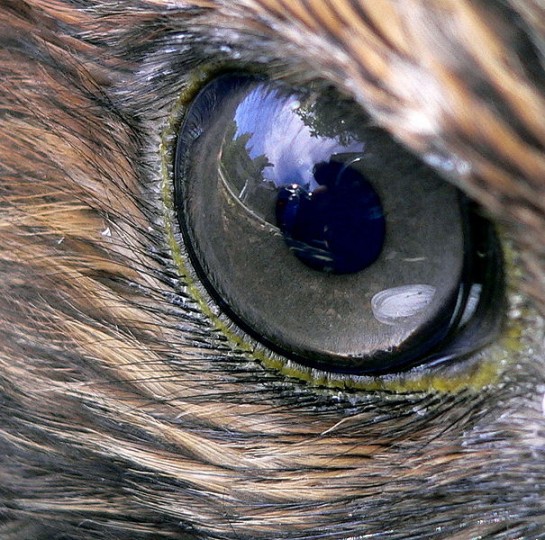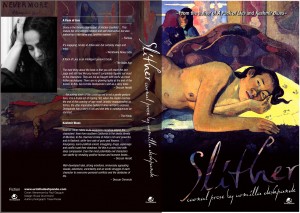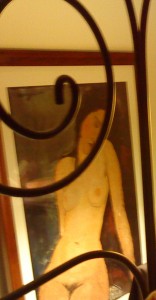
The cathedral is thrust six hundred feet out of the ground as though in an instant by forces of the earth, but it was built painstakingly stone over stone, century after century. It seems as a young mountain peak, angry and defiant, piercing the sky darkly even on bright summer days though it is neither angry nor young, but insolent and anchored. The hawk was invisible on the brittle silhouette of a Northern spire. He looked down at the people floating in and out and around his home on a stream of time. He had lived there long, he knew the change of the seasons by the smell of the river and the coming and leaving of the small animals and birds he lived on. His memory was a continuum. He knew what his mother had known, what his brothers and sister had known, what his children would know. That the city grew long icicles in the long winter, that parakeets flew over the river in the summer, that dogs barked on barges that floated down to the sea, that people cried in their aeries at night, that mice came out into the cobbled streets to look for sustenance, and so he would not be hungry.
The sun rose warm and torpid that day, took its time to traverse the sky. The girl came everyday with the woman, she sat on a bench under the trees, she ate, she sometimes went inside the cathedral, and then they left, walking fast toward the bridge. He could see her all the way to the great train station where frantic pigeons lived, and then, every day, she left his line of sight, and he did not know if he would ever see her again, but he did, that day. The girl was not like the others. She moved her hands, like wings, her fingers like the tips of his own wings. She turned her head, like he did, she looked at everything. When crowds of children ran screaming right behind her, she did not turn to look. She did not flinch when the sirens burst into the air. He cried out to her, in short notes and long, keening straight down to her. She
looked up. There was someone or something there, she felt it. She had felt it since they had first started to come to this place. When she was a baby, her mother would push her there in a stroller. She remembered it. When she was gone, her grandfather would walk with her, his hand around hers. And when he was gone too, and she was old enough, now she brought the old aunt here, to feel the presence of time. Time was more than now, in this place. More than before and after and today and tomorrow. It was nothing unnatural or supernatural, that she felt. Just a presence, an acknowledgement of her presence other than all the eyes of all the people who did not watch her, or even see her. She was outside their world. She had always known that, since she was born, she had known that. I am mud, she felt, part of the mud, sludge, lies of the earth, and she looked up at the shiny hawks that flew above her sometimes alighting to swoop up some creature of the world so he would be shiny and grow wings in us all. Maybe, she sometimes felt, it was the hawks watching her. There was always a hawk. If she looked carefully, if she felt for him, she felt him, and then she knew where to look so she could see him. She could feel them. She always had. She felt them calling to her. Maybe, she thought, they were looking for another of their own, maybe she was just in the way, and received a message not intended for her, and maybe she just received it in her loneliness, because everyone else was so busy with what they did with each other. She saw him, almost lost in the uneven edges of the spire. If he hadn’t moved in readiness to fly she would not have seen him. His shape separated from the darkness and took off into the light summer sky, growing larger not smaller, as he coasted down and settled on the bare branches of the tree right in front of her. He looked right at her with his cat eyes, turning this way and that and
he opened his wings slightly to balance on the branch he had known was too weak to support his weight, but he wanted to look at her. She looked back at him, and he could see her clear eyes, a winter sky, she saw things far away, and things very small, and she could see him, and he could see her, so he ruffled his wings again, just to preen, just to show her the bars on his tail, the unbroken curve of his beak, he turned his head this way and that giving her both sides of his fine head, his tawny eyes. Then he took off from the tree, straight up to his northern spire, wings in full span, tips spread out, he knew she was watching him, he was keening as he rose, knew she didn’t actually hear him, but that she did
feel him. The old woman was tired and wanted to leave, so they walked to their train. There were vendors crowding the square almost to their doorstep by the time they got home. When they had left, very early in the morning, people were just driving up, some unpacking and laying out their white asparagus and silver mackerel. Now they crowded every foot of the market square, and women in scarves covering their hair and ears walked behind dark men with dark eyebrows and mustaches, stopping to maul tomatoes and to taste pastes of chickpeas and garlic and aubergines and almonds, critical and careful and aggressive and very busy. They all moved their mouths, and lips, incessantly, as people did. As she once had, only she did not remember it, not as an act anyway, just a distant shadow, the imprint of a wet leaf on the concrete, long blown away. She bought a huge slice of apple cake from a woman who had known her mother, to eat as she looked out of her window at the cathedral. She knew her aunt was telling her not to, but she didn’t look at her. They bought a piece of pork, to put in the soup, and then walked up the stairs. The aunt opened her door and went in, not bothering to say goodbye, or thank you, or anything at all. She had never expected it, and was surprised at herself for noticing the lack of acknowledgement. She went two more flights up to her own rooms , in the attic, with dormer windows and slightly sloped ceilings, and a view of the only thing she wanted to see.
She had no tv or radio, just her father’s books, and the paintings on the walls, and the windows, and the remains of a life she had had with a man once, before he tired of her silence and left. His warm robe she used in the winter, his razor in the summer, when she would wear a cool dress, and lay in the grass by the river, watching the parakeets and the barges for hours until it was near dark. She wondered, as she ate her cake, if the hawk could see her in the window. She wondered, if she walked all the way home instead of taking the train, if he would follow her, and sit on her window sill, or share his fresh killed mouse with her. She brushed her teeth and lay in her bed, and even from there, she could see the distant spire, and she imagined she could see him, soaring in the still blue summer sky, making the stars come and go as he covered them with his wings. The image was still in her eyes as she slipped quietly from conscious into sweeter realms, from the city streets in daylight to the night sky, and the smell of grass and leaves and the touch of wings on her face.
It was still dark. She looked up at the spires she had looked at every day of her short, silent life. She stood there a while, and then saw him, her hawk. He sat on the lowest part of the scaffolding, swinging slightly in the mild breeze. He turned his head and opened his beak, and she felt a vibration. She felt him calling to her. She closed her eyes so she could see nothing, only feel, and see what he was showing her. She felt his wings, she felt the air through them, she saw what he saw, as he rose, higher and higher and higher, past the gargoyles and the saints and the flying buttresses, past the low clouds till there was no dimension to anything anymore. And below her the church, just a small green cross, laying on the face of the earth.
Down on the ground, she felt her feet, and she leaned against the dark abraded stone. The scaffolding was right beside her, and she held the cold metal to support herself. She was dizzy, a little dazed, as if she had really flown too high too fast. And she soon recovered, but there he was again, the hawk, calling to her. She saw him, again on the scaffolding she was holding. They were connected by the metal, and she could feel him so clearly as if he was inside her head. She took off her shoes and her socks and put her bag beside them too, and with the firm grip of her hands and feet, she began to climb up to him. She saw his golden eyes come closer, he did not move, just sat there, unafraid, as she climbed. And when she was close enough to touch him, when she could see the shafts of his feathers, he lifted off his perch and sank a little before opening his wings wide, so the pale pearl sky shone through them, and went a little higher. She followed him. And so they climbed, together, to the point where she could go no further, and she stood on the narrow wood laid there for someone who would stand there and clean the stone of its darkness, inch by inch, always seeing only the stone before their eyes, never the whole church, all at once.
He was there, at her shoulder, this hawk of hers. And they both stepped into the air together, the girl and her hawk. He called to her, and she answered him, as she trusted the air beneath her feet,
he called to her as he went down, short winged and fast after her, and he stopped his drop and floated, but she did not recover her span, she did not come up with him.
He called to her, and she answered. Once.
He called to her again, but she said no more.
They all heard him. The man in his bed alone stopped in mid stroke, yearning for his woman, he called too, for her, across the river, in another bed with another man, he called to her, he could not but momentarily end his eternal longing, beating it into temporary submission, an injured creature biting the dust. The woman heard him, and she called to him, the lonely scream of a prisoner in a room, a heavy old iron bed, velvet drapes, her wedding ring on the table beside her, she called to him across the river. And the baker heard him, as he pounded his dough, and called too, for the sun to rise, for the morning to take him out of the heat of the ovens and away from the sweat of the labor. And the little boy heard him, as he tumbled in the grass, upside down in the early morning grass, and he looked, upside down at the sky, and he saw the hawk, red tailed in the rising sun, and he laughed, and all was right with the world.
~






